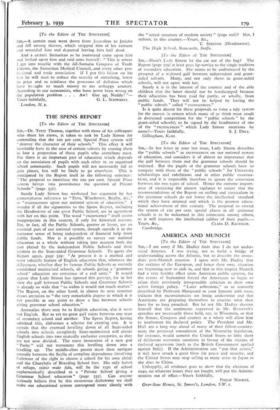THE SPEWS REPORT
[To the Editor of THE SPECTATOR] SIR,—Dr. Terry Thomas, together with those of his colleagues who share his „views, is taken to task by Lady Simon for contending that the too per cent. Special Place system will destroy the character of their schools." This effect it will inevitably have in the case of certain schools by causing them to lose a proportion of those pupils who contribute most. For there is an important part of education which depends on the association of pupils with each other in an organised school community. Such pupils will not necessarily fail to gain places, but will be likely to go elsewhere. This is anticipated by the Report itself in the -following sentence : " The proposal to introduce the too per cent. Special Place system brings into prominence the question of Private Schools " (page 331).
Surely Lady Simon has weakened her argument by her contemptuous reference to " Eton,'Winchester, Rugby, &c.," as " excrescences upon our national system of education." I wonder if all the signatories to the Spens Report, including the Headmaster of one great Public School, are in agreement with her on this point. The word " excrescence " itself seems inappropriate in this context, if only for historical reasons. But, in fact, all the Public Schools, greater or lesser, are an essential part of our national system, though outside it in the narrower sense of being independent of financial help from public funds. Nor is it possible to survey our national education as a whole without taking into account both the part played by the independent Public Schools and their relation to the State-aided Grammar Schools. To quote the Report again, page 329: " At present it is a marked and most valuable feature of English education that, whatever the differences, whether they be famous Public Schools or recently established maintained schools, all schools giving a ' grammar school' education are conscious of a real unity." It would appear that Lady Simon has ignored this passage, for in her view the gulf between Public Schools and Grammar Schools is already so wide that " to widen it would not much matter." The Report, on the other hand, in almost its next sentence draws attention to " the very remarkable degree in which it is not possible at any point to draw a line between schools giving grammar school education."
Anomalies there may be in English education, else it were not English. But as yet no great gulf exists between one type of secondary school and another. The Spens Report, having admitted this, elaborates a scheme for creating one. It is certain that the eventual levelling down of all State-aided schools into schools completely State-maintained will divide English schools into two mutually exclusive categories, as they are not now divided. The mere invocation of a new god " Parity " will not transmute this levelling down into a levelling up. The middle-class parent must then navigate uneasily between the Scylla of complete dependence (involving forfeiture of the right to choose a school for his own child) and the Charybdis of 'Boarding School fees. His only haven of refuge, static male fide, will be the type of school euphemistically described as a "Private School giving a Grammar School education " (page 332). Can anyone seriously believe that by this monstrous dichotomy we shall make our educational system correspond more closely with the " actual structure of modern society " (page xxii)? Not, I submit, in this country.—Yours, &c., T. STINTON (Headmaster).
The High School, Newcastle, Staffs.










































 Previous page
Previous page